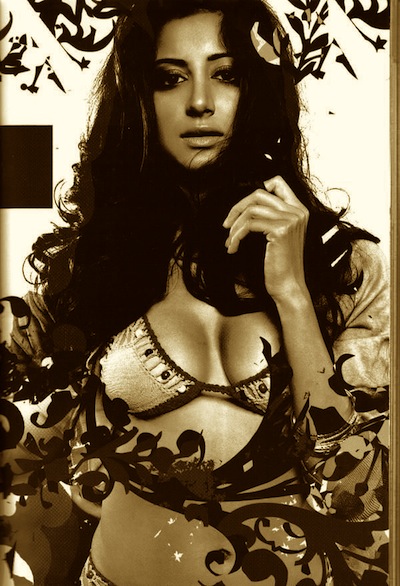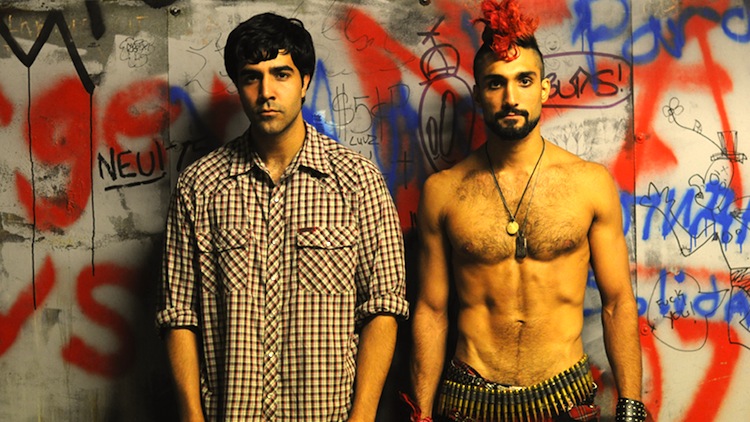By Patricia Ducey. The Taqwacores is one of a few notable films lately (like Four Lions) nibbling at the margins of mainstream cinema with Muslims as its subject. Supported and developed at Sundance, and distributed by Strand Releasing, The Taqwacores is an original and winning little marvel.
The word taqwacore itself is a mashup of “taqwa,” meaning piety, and “core,” for hardcore – and the movie itself was adapted from Michael Muhammad Knight‘s 2003 novel, The Taqwacores, about an imagined Muslim punk scene in the U.S. – which in turn inspired an actual Muslim punk scene in America, then a documentary about it, and then this movie.
Strangely,The Taqwacores has been outright reviled by mainstream critics, but well-liked by audiences – Rotten Tomatoes gives it an 11% approval by critics and 51% by audiences – illustrating the apparently growing divide between the critical community and moviegoers. (I first began to notice this divide five years ago when I read a review of Memoirs of a Geisha, a movie I enjoyed and felt surpassed the novel, which stated that while the movie was well done and compelling, the reviewer felt he could not give it a thumbs up because its subject was a Japanese woman who engaged in and enjoyed – yes, shockingly, enjoyed! – an affair with an American military man in post-WWII Japan.) Sadly, it seems as though too many critics are either intimidated by political dogma, or feel obligated to uphold the politics and aesthetics of their mentors, to give little films like The Taqwacores a fair hearing.

The most unique aspect of The Taqwacores is that, for once, American Muslims are portrayed as the subject of a narrative and not as an objectified “other.” The Taqwacores is actually a coming of age story told from within a unique strata of American culture, with young people and their hopes and fears propelling the story. We are viewing the story of young American Muslims as they tell it to us in the way they want to tell it.
By contrast, a ‘mainstream’ Hollywood narrative would probably have involved a journalist writing about a punk rock scene that was pulling in local Muslim youth and ‘contaminating’ them with Western values. Somehow he would save these poor, besotted naifs; and, music swelling, the youths would return to the more pure, authentic lifestyle of their Muslim parents. (Or maybe a burned-out, disabled U.S. military vet would travel to another planet and rescue these well-meaning young people from American imperialism?)
In doing this, you might say that The Taqwacores revives the genre of politically incorrect cinema. I have not seen a movie that turns cliché on its head with such relish since the superb Last King of Scotland, a film that was as much a scathing indictment of western do-goodism as of Idi Amin.
As we hear the worried telephone voiceover of his mother, we meet young college kid Yusuf (Bobby Naderi), an American of Pakistani origin, arriving at a student rooming house run by “good Muslims,” as his mother assures him. Yes, a devout brother, Umar, does greet him and show him to his neat room, outfitted with a Koran – but as the day goes on, Yusuf begins to suspect that something is not quite halal about this place: metal music blares from the floor below; the refrigerator is filled with beer and nothing but beer; the one sister in the house, Rabeya (Noureen DeWulf) greets him – in a burqa covered with punk patches – and chats casually with him. A woman and man alone together, alcohol and rock and roll! What has Yusuf gotten himself into?
He spends the rest of the movie finding out. Soon he meets the other roommates – most notably the charismatic Jehangir (Dominic Rains), lead guitarist and resident punk theoretician. Jehangir has conceived his own anarchistic and liberating version of Islam, as expressed in his music. But Jehangir loves all music and especially idolizes Johnny Cash – “Johnny ruled the world” – and Jehangir is tired of being small. He wants out of submission and into relevance.
The roommates conduct Friday prayers, but with the woman, Rabeya, giving the sermon, and the prayers are usually followed by an all out drunken bash. Yusuf eventually falls for pretty former Roman Catholic Lynn, who has embraced Islam for its seeming lack of hierarchy that stands in contrast to her Catholic faith. But she and her freewheeling sexuality prove too much to Yusuf at the moment. Gradually though, Yusuf comes to understand and appreciate these new feminist and radical interpretations of his beloved Islam. He respects and is even thrilled by the way his housemates question and argue and embrace the Big Questions of life, like students everywhere, but he can’t jump into the mosh pit quite yet. And even though Yusuf is devout, he harbors no hostility to anyone – in contrast to angry young man Umar. He soon develops real affection for his housemates and their motley crew of hardcore rockers, feminists, and gays.
Yusuf changes, and he grows.

Bobby Naderi plays Yusuf with the winning innocence of Dustin Hoffman in The Graduate. I would call this a breakout role for Naderi, except that America’s critical establishment has frozen out this little film and Mr. Naderi along with it. Dominic Rains brings handsome, tragic Jehangir to life, and the supporting characters all shine. Shot in primary colors against the grey sky of Buffalo’s winter, the camerawork echoes the graffiti slathered over every inch of the Taqwacores’ corner of the concrete jungle, and frames its characters like they are jumping off the page of a graphic novel.
Unfortunately, I suspect The Taqwacores will come and go quickly from theaters (not unlike Memoirs of a Geisha). So for an evening with Yusuf and his friends of smashing taboos and shocking the neighbors – set against the music of real taqwacore groups like The Komanis – you’ll have to move fast.
But it will certainly be worth it.
Posted on November 19th, 2010 at 9:40am.